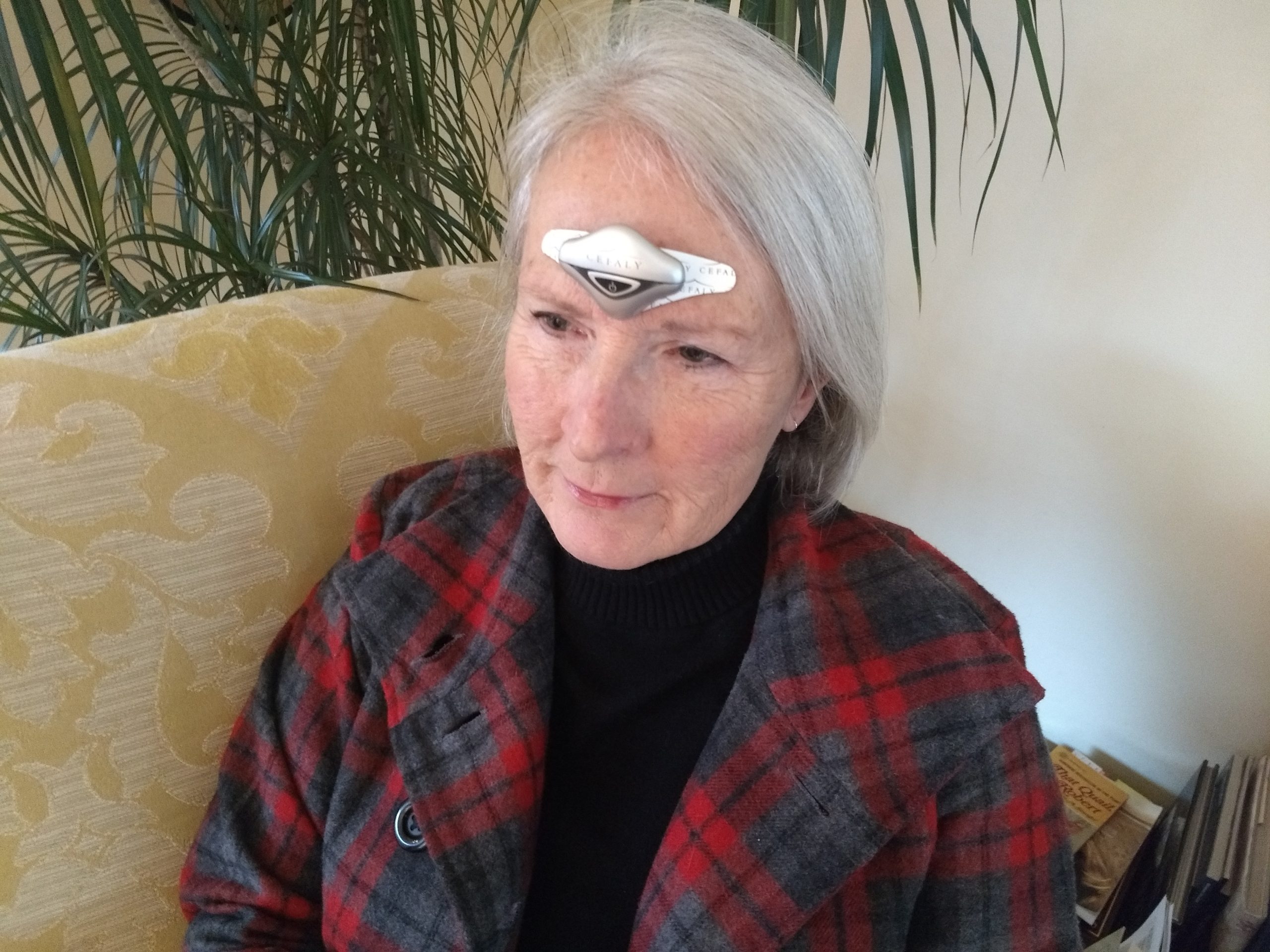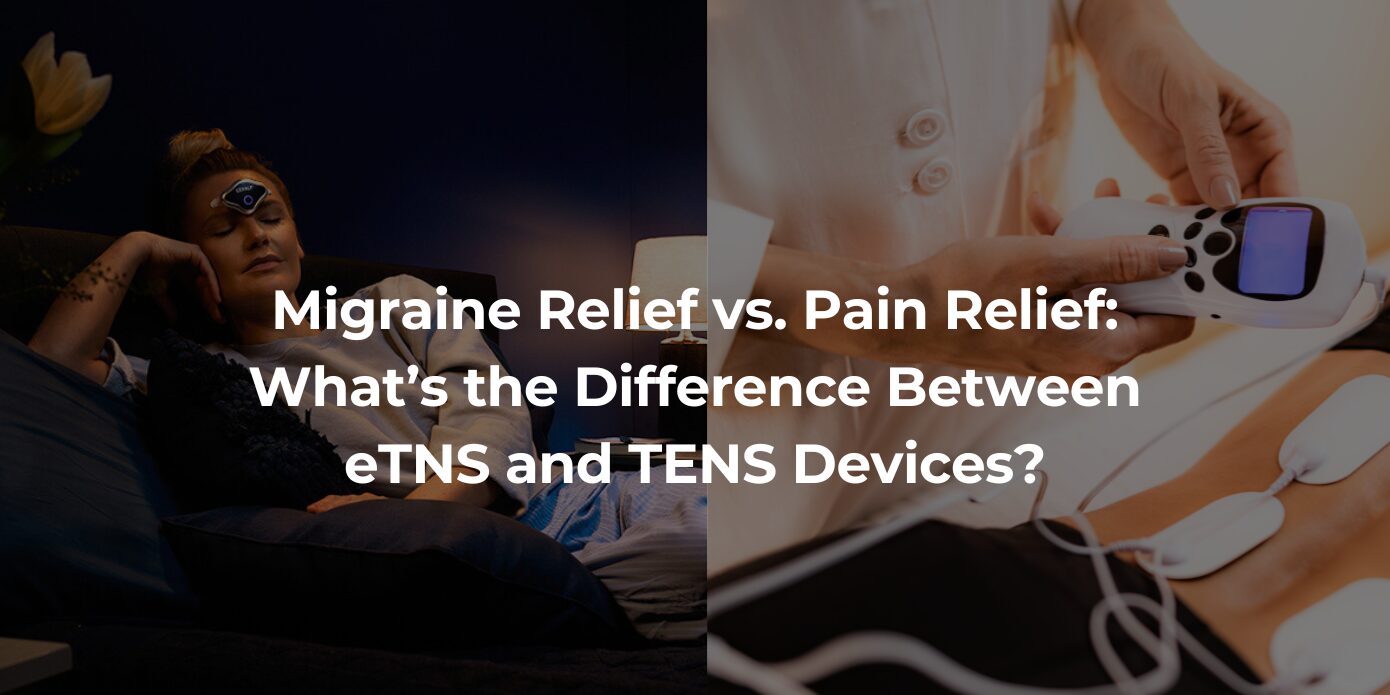- What are SSRIs?
- Can SSRI cause migraine?
- Can SSRI withdrawal cause migraine?
- Can antidepressants help migraine?
- Non-pharmaceutical alternatives to treat migraine
Living with migraine and conditions like anxiety or depression can feel overwhelming — especially when you’re taking medications for both. If you’ve been prescribed antidepressants, you may wonder how these two conditions — and their treatments — interact. Can SSRIs trigger migraine or make it worse? Or, could they actually help alleviate migraine symptoms?
Understanding the relationship between the two may help you better manage migraine and SSRIs more effectively with your healthcare provider.
What are SSRIs?
Selective serotonin reuptake inhibitors (SSRIs) are a type of antidepressant medication that helps individuals suffering from depression. They’re also used to help treat anxiety and other mood disorders. To know how they work, we need to understand serotonin’s role.
Serotonin is a chemical in your brain that helps regulate your mood and emotions. Low serotonin levels are often associated with depression and anxiety. Usually, after the brain cells use serotonin, the chemical is reabsorbed by the nerve cells that release it. This reuptake process leaves less serotonin available in your brain. That’s where SSRIs come in.
SSRIs block this reuptake process. So, instead of getting reabsorbed too quickly, serotonin stays in the space between your brain cells — known as the synapse — for longer. More serotonin translates to better moods and regulated emotions. However, the process is not as fast as it may sound. It usually takes a few weeks for SSRIs to build up enough to result in any noticeable mood changes.
There are various types of SSRIs with different purposes. Some may help treat depression, anxiety, obsessive-compulsive disorder (OCD) or post-traumatic stress disorder (PTSD).
Some common U.S. Food and Drug Administration (FDA)-approved SSRIs include:
- Fluoxetine (Prozac)
- Sertraline (Zoloft)
- Citalopram (Celexa)
- Escitalopram (Lexapro)
- Paroxetine (Paxil)
Common side effects of SSRIs
Side effects of using SSRIs can include:
- Sweating
- Shakiness
- Dry mouth
- Headaches
- Upset stomach
- Appetite changes
- Sleeping problems
- Sexual dysfunction
- Restlessness or nervousness
About 80% of individuals taking SSRIs will experience at least one of these side effects. Additionally, more than half will experience more than one side effect. Some adverse effects may completely clear out after a few weeks, while others may persist, advising you to consult with your healthcare provider to change your medication.
Can SSRI cause migraine?
The short answer — potentially yes. SSRIs may trigger or worsen migraine as a potential side effect. An antidepressant headache may manifest when an individual starts an SSRI or changes their dosage. That said, not everyone experiences this SSRI migraine side effect.
The two medications may interact in the following ways:
- Possible migraine trigger: An SSRI headache is one of the possible side effects. For people prone to migraine, these headaches could potentially evolve into SSRI migraine episodes.
- Worsening migraine frequency: SSRIs may worsen the frequency of migraine for certain people. If someone is sensitive to serotonin level changes, they may be more likely to experience migraine flare-ups as their body adjusts to the medication.
- Migraine medication interaction: Some migraine medications — like those in the triptan class — may increase serotonin syndrome risk when combined with SSRIs. A rare and serious condition, serotonin syndrome occurs when there’s too much serotonin in the brain and can cause symptoms like headache or migraine.
If you experience serotonin syndrome symptoms like high fever, seizures, tremors, irregular heartbeats or unconsciousness after combining an SSRI with a migraine medication, seek emergency medical care immediately. Early intervention is crucial with serotonin syndrome to prevent serious complications.
Get Drug-Free Migraine Relief With CEFALY
Shop Now
90-day money back guarantee
FDA-cleared
financing available
Can SSRI withdrawal cause migraine?
Again, potentially yes. When someone stops taking SSRIs — especially too quickly or without proper medical guidance — they may experience antidepressant discontinuation syndrome (ADS). With ADS comes a myriad of symptoms, including headaches.
Here’s how an SSRI withdrawal may trigger or worsen migraine:
- Rebound effect: As we know, SSRIs help regulate serotonin levels. If someone suddenly stops taking their SSRIs, the drop in serotonin may disrupt normal brain function and trigger migraine in individuals prone to them.
- Withdrawal headaches: Headaches are just one of many SSRI withdrawal symptoms. However, they may escalate into migraine for those who are sensitive to such changes.
- Increased sensitivity: During withdrawal, the brain may become more sensitive to common migraine triggers. Individuals prone to migraine may want to avoid these triggers, such as stress, dehydration, certain food or drink or sleeping habits. This is where a migraine diary may come in handy.
- Mood and stress changes: Changes in mood are another common ADS symptom. Some mood changes include increased anxiety or depression, which can, in turn, trigger migraine episodes.
Other ADS symptoms include:
- Anxiety
- Nausea
- Dizziness
- Tiredness
- Headaches
- Vivid dreams
- Mood changes
- Flu-like symptoms
- Depression symptoms
Can SSRI antidepressants help migraine?
Certain antidepressant classes can help with headache or migraine severity and frequency. However, there is little evidence of this result on SSRIs and serotonin and norepinephrine reuptake inhibitors (SNRIs). Tricyclic antidepressants (TCAs) seem to be the most effective.
Here’s how antidepressants may help:
- Serotonin regulation: Some cases of migraine may be linked to serotonin imbalances in the brain. Antidepressants can help regulate these imbalances and could thus reduce migraine severity and frequency.
- Reducing stress and anxiety: Since stress, anxiety and depression are common triggers for migraine, antidepressants can help. They address the underlying mental health conditions that might contribute to migraine attacks.
- Preventive use: Antidepressants like amitriptyline — a TCA — can help prevent migraine in individuals, even if they don’t experience depression.
That said, antidepressants’ side effects and effectiveness vary depending on the medication and person. Consult with a healthcare professional if you have any questions or concerns.
Try CEFALY to Prevent & Relieve Migraine Pain
Non-pharmaceutical alternatives to treat migraine
For those taking medications for mental health conditions, like SSRIs, it may be worth exploring non-drug treatments for migraine. This is to help avoid potential interactions with prescribed medications. Let’s go over a few non-pharmaceutical options to consider.

1. Acupuncture
This traditional Chinese medicine technique has been shown to help some people reduce migraine frequency and intensity. This relaxation technique may help with symptom relief and pain management.
2. Lifestyle changes
Many lifestyle adjustments can help prevent migraine, including:
- Dietary changes: Identify and avoid triggers like alcohol, caffeine and certain foods to reduce migraine frequency.
- Stress management: Try techniques like yoga, meditation or even cognitive behavioral therapy (CBT) to reduce stress.
- Supplements: Some people see improvement from taking supplements like magnesium, riboflavin (vitamin B2) and coenzyme Q10.
3. Wearable medical devices
Wearable medical devices can help with migraine management. One example is CEFALY, an FDA-cleared, wearable device designed to provide drug-free relief from migraine.
It uses external trigeminal nerve stimulation (eTNS) to deliver precise electrical impulses through an adhesive electrode on the forehead. This device targets the trigeminal nerve — the main pathway for migraine pain. CEFALY offers two treatment modes:
- The ACUTE program for relief at the first sign of a migraine attack
- The PREVENT program for daily use to reduce the frequency of attacks
Take control of your migraine treatment today with CEFALY
If you’re looking for a proven, drug-free alternative to manage and prevent migraine, CEFALY offers a solution. It targets the root cause of migraine pain and helps reduce the frequency of attacks with consistent use.
Ready to try a new approach to migraine treatment? Try CEFALY for 90 days with a money-back guarantee!















